It’s 3:30 am Mumbai time on November 27th and I am wondering if it’s a bad time to call my friend Ajay in India; I am watching Mumbai burning on CNN and my heart’s sinking—can’t have even one satisfying answer to why people decide to go on a rampage like this.
It’s interesting how knowing even one person makes a difference in our relative desensitization towards systematic acts of violence. What causes this rage and brutal frustration?
I asked my friend, Nimesh Didia, to just go out and take some random pictures of the area and people; I was grateful to receive all of these images from him yesterday.
Regular Mumbaikars are replaced by soldiers and the world press; it’s an exercise in futility to try to make some sense of the incomprehensible…
The Taj Mahal hotel survived the fire but at least 170 people didn’t. To see excellent pictures click here.
Maybe great solidarity and large-heartedness in times of peril will save the city. India and Pakistan have a bloody history since the partition in 1947 and these incidents are not helping.
Even James Bond couldn’t keep the Regal movie theater open on the first days of attack:
but the clean up work has started:
The best article I read is Suketu Mehta’s in NY Times— he eloquently describes the feelings of many of the 18 million people pf Mumbai. Read it here.
As you can see, life continues (it always does) in spite of the recent calamity:
May it be sweeter from now on for India.
“Partition’s people stitched
Shrouds from a flag, gentlemen scissored Sind.
An opened people, fraying across the cut
country reknotted themselves on this island.”

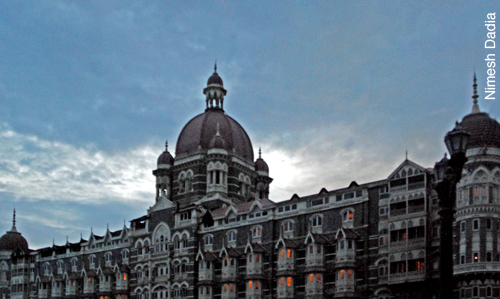
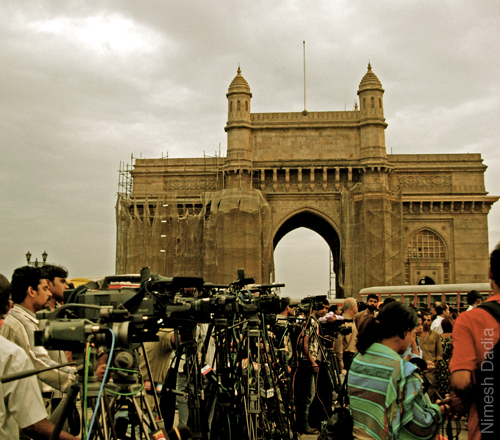
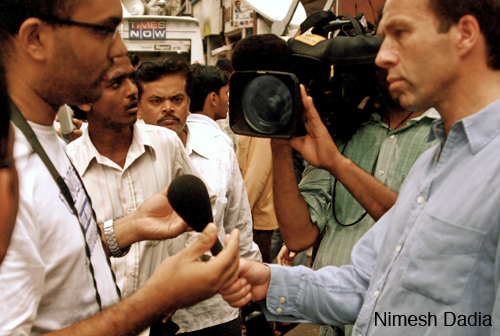
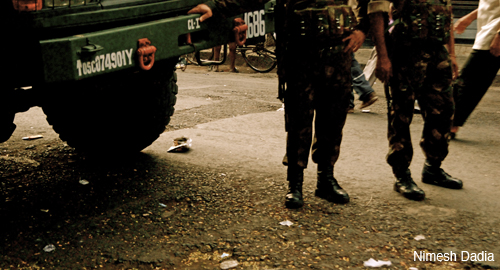
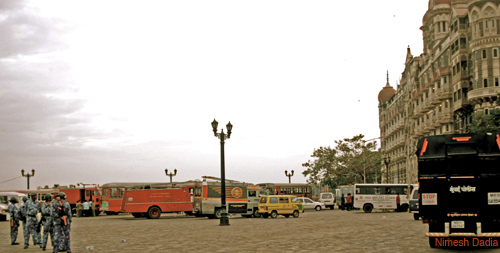
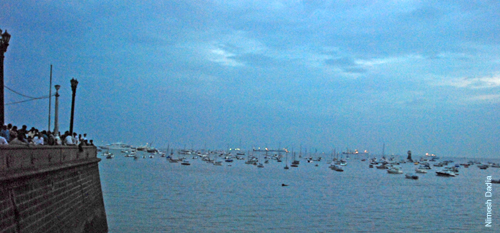
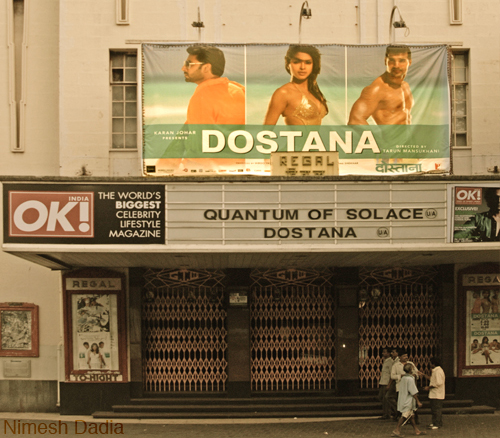
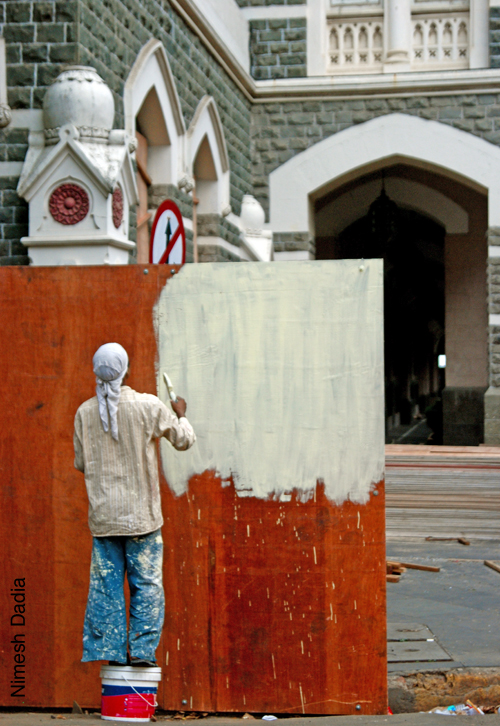
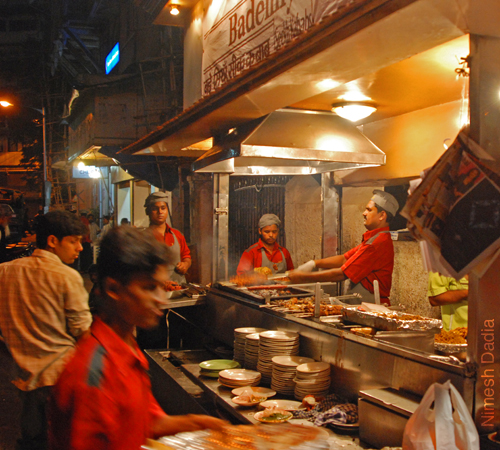
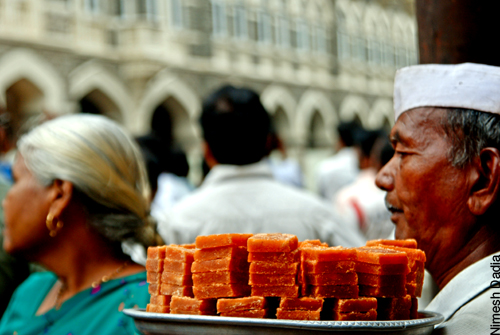
Michele and Nimesh :
This island attracts and repels me
with its strong aroma, unshakeable faith,
kindly eyes, brutal acts,
I have often lived there
but, in my dreams.
Warmth
Max
Wonderful photographs by Nimesh Dadia and Adil Jussawalla. I also liked Suketu Mehta in NY Times but Mumbai/India/Terrorism are difficult to catch in one article especially when it is trying to tell you mainly about the courage of Mumbai. True people show courage – time and again but some courageous stories never reach the media let alone urban well to do citizens.
And in this age of globalization that kind or courage is out of fashion….. the courage of Adivasis displaced by the Narmada Mega Dam, the courage of Farmers who commit suicide when Govt driven pauperization strips them of any self respect, the courage of ordinary urban citizen for whom daily life itself is terror.
I think it’s time we broaden the canvas as we reflect, grieve and mourn the innocent and start picking up the pieces of our own shatterred self.
—
Sujit
Les massacres, les carnages ont toujours existé. L’instantanéité de la communication médiatique fait que nous sommes informés pratiquement au moment où se déroule l’action, nous réduisant immanquablement et fatalement au rôle de spectateurs impuissants, pouvant juste cultiver un sentiment de culpabilité ou de désarroi devant la folie meurtrière.
De plus, le carnage intervenu à Bombay a pris pour cible un hôtel de luxe fréquenté par des investisseurs étrangers et des touristes.L’investissement international et le tourisme : deux éléments de cette mondialisation que d’aucuns voudraient heureuse et garante d’une prospérité paisible,alors qu’elle est arbitraire et source de conflits même si elle est inévitable.
Il ne faut pas oublier que les terroristes ont aussi attaqué un hôpital et une gare.
Au reste, et c’est sans doute ce qui est le plus choquant, ces “fous de Dieu” ont des pratiques moyen-âgeuses (“tuez-les tous : Dieu reconnaîtra les siens”) qui nous ramènent à des périodes historiques où la vie individuelle ne valait rien ou presque. Or, il en va tout autrement dans notre société occidentale contemporaine.
Massacres and carnages have always existed. The instantenity of communication through media makes it possible for us to be informed pratcically at the moment of the event and we are reduced fatally to the role of powerless spectators, only able to sense a guilt or helplessness facing the murderous madness.
In addition, the carnages at Mumbai was targeted at a luxurious hotel frequented by foreign investors and tourists. Foreign investment and tourism : two elements of this globalisation which guarantees a pleasurable prosperity while being arbitrary and is the course of conflict.
One has to remember that the terrorists also attacked a hospital and a station.
For the rest, and without doubt what is most shocking, these ” mad lovers of God” have practices that come from the Middle Ages – kill them all and God will recognize his own- which bring us back to historic period where the life of the individual didnt have much value. Whereas our contemporary Western society is going in completely the opposite direction.
La violence “aveugle” et les “aveugles” aveuglés par d’autres aveugles.
Le fanatisme au paroxysme.Le désarroi comme le dit Philippe nous frappe de plein fouet en même temps que la folie meurtrière. Oui nous demeurons sans voix.
Certains sont aveugles, nous sommes muets de stupéfaction, et réduits à l’état de statues de pierre.
Votre sujet est très émouvant Michèle, et les images de vos amis nous montrent un peu plus le courage des uns face à la lâcheté aveugle des autres.
Violence by the blind and the blind blinded by others who are blind.
is it fanaticism or the peak of a crisis?
The disarray is as shocking as the murderous madness. yes we rest without a voice Some are blind, we are mute with stupefaction, and reduced to statues in stone.
Your subject is very moving Michele, and the images your friends are showing us display some more courage than the blindness of others
people’s ideas make the world change its white role to black one.we are guilty about this world’s crying eyes when tie our opinions to the frizzy political and religious beliefs.
Dear Michele
Thanks for your concern , compassion and sensitivity
Who are we ? Where do we come from ? Why are we this way and not some other ? What does it mean to be human ? Are we capable, if need be, of fundamental change,or do the dead hands of forgotten ancestors impel us in some direction, indiscriminately for good or ill, and beyond our control ? Can we alter our character ? Can we improve our societies ? Can we leave our children a world better than the one that was left to us ? Can we free them from the demons that torment us and haunt our civilization ? In the long run, are we wise enough to know what changes to make ? Can we be trusted with our future ?
We humans are like a newborn baby left on a doorstep, with no note explaining who it is, where it came from, what hereditary cargo of attributes and disabilities it might be carrying, or who its antecedents might be.
We long to see the orphan’s file
— Carl Sagan
I can not think of any war or act of terrorism without any economic gains attached to it. In our modern times, the profit motive of the military-industrial complex is outstandingly high.
To stop the wars and terrorism, we must re-channel our military-industrial complex into
humanitarian industries.
Askin Ozcan
Author
Web-page:
http://www.xlibris.com/AskinOzcan.html
Dear Michele
I must thank you to moot this issue on your blog.
The most intersting outcome of this disaster has been that the Citizens have not victimise the indian minority ( i.e the MUSLIMS livingin India )
or the Pakistani Citizens but rather the Indian Politicians have been nailed.
Nimesh
i think these pictures at http://www.boston.com/bigpicture/2008/11/mumbai_under_attack.html can relay the actual horror of the moment…
Humanity i love you
because you would rather black the boots of
success than enquire whose soul dangles from his
watch-chain which would be embarrassing for both
parties and because you
unflinchingly applaud all
songs containing the words country home and
mother when sung at the old howard
Humanity i love you because
when you’re hard up you pawn your
intelligence to buy a drink and when
you’re flush pride keeps
you from the pawn shops and
because you are continually committing
nuisances but more
especially in your own house
Humanity i love you because you
are perpetually putting the secret of
life in your pants and forgetting
it’s there and sitting down
on it
and because you are
forever making poems in the lap
of death Humanity
ee cummings
Nimesh & Michele, both of you are so good with your fingers & put them to real good use …. your pictures and captions have captured our (Indians)tragedy, vulnerability, sad state of affairs, alongwith our (always spoken about)resilience.. strong will to get out of a situation (the ‘clean-up guy & the sweets fella’),,,, &, their (??) atrocities and mindlessness …they have to be so much dead inside their hearts / heads to go about doing what they did … and, apparently with no remorse in sight, this doesn’t seem to be the end of it!!! 🙁 Happy to know though,that, people from all over condemn this act and nice to feel their heart reaching out to over here …
Ajaybhai, thanks for insisting that i check this blog / pics / captions….
Pardon the intrusion, Ms. Michele & thanks for taking up this issue (so effectively) on your blog.
Aashish
“The human brain is an imperfect instrument built up through long geological periods. Some of its levels of operation are more primitive and archaic than others.
Our heads, modern man has learned, may contain weird and irrational shadows out of the subhuman past–shadows that under stress can sometimes elongate and fall darkly across the threshold of our rational lives. Man has lost the faith of the eighteenth century in the enlightening power of pure reason, for he has come to know that he is not a consistently reasoning animal.
We have frightened ourselves with our own black nature and instead of thinking “We are men now, not beasts, and must live like men,” we have eyed each other with wary suspicion and whispered in our hearts, “We will trust no one. Man is evil. Man is an animal. He has come from the dark wood and the caves.”
– Loren Eiseley Darwin’s Century
how wonderful that somebody—Manisha Gutman— translated the french comment of this post; thank you Manisha and Sujit Patwardhan!
Cher Philippe
Votre commentaire etait tres incisif.
Nimesh